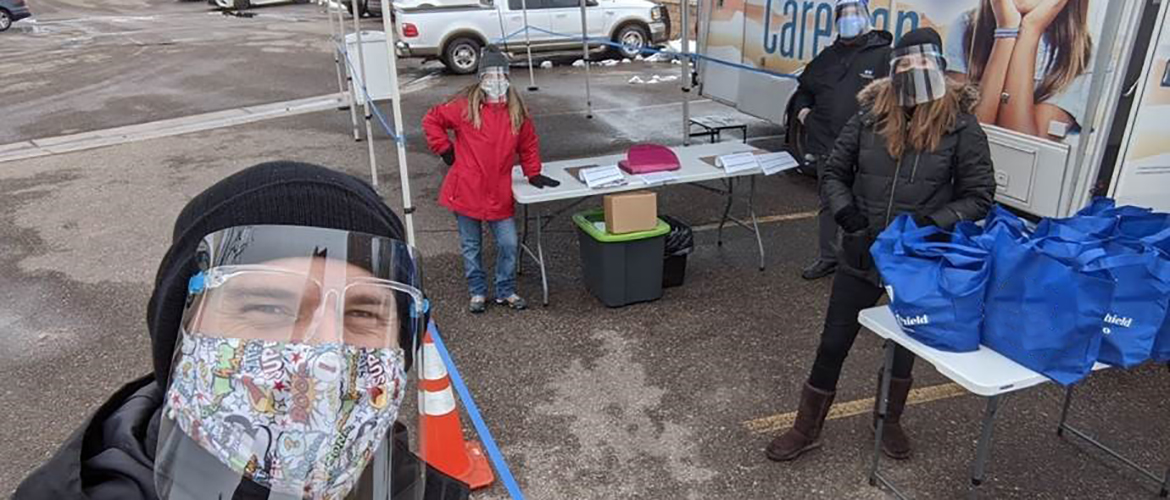As infections from the novel coronavirus began spiking and New Mexicans retreated into the safety of their homes, Medicare outreach specialists Amy Fisher and Tony Nichols still found opportunities for connection.
In the spring, they transitioned from meeting Medicare members in person to calling them and helping them receive wellness rewards earned through their plans. They also checked to determine whether members were healthy and safe while staying home during the pandemic.
So far, Fisher and Nichols — outreach specialists for Health Care Service Corporation’s plan in New Mexico — have helped about 125 members collect more than $9,000 in gift cards they earned for achieving wellness benchmarks such as getting colonoscopies or annual flu shots and wellness exams.
"The impact has been so great that making these calls to our members has to be a priority."
The calls were part of a larger HCSC effort to check in with Medicare members as they quarantined at home. The company reached out to thousands of members in Illinois, Montana, New Mexico, Oklahoma and Texas to help them redeem gift cards and answer questions about their benefits.
“Many of these members were not aware they were earning this money,” Fisher says. “These folks are on a fixed income. A $100 gift card can make a huge difference.”
With an 18% poverty rate, New Mexico is one of the poorest states nationwide. Fisher and Nichols know the gift cards may help many of these members buy groceries and prescriptions.
“The impact has been so great that making these calls to our members has to be a priority,” Fisher says. “With the pandemic, there’s no other way to reach out to our members. It’s super important to keep these relationships going.”
While on the phone, she and Nichols also asked whether members had access to food and other necessities and answered members’ questions. Although a vendor also was making similar customer service calls on behalf of the insurer, the pair volunteered to call New Mexico Medicare members to stay connected to them.
“To get a call from somebody who lives in the same community as our seniors shows we care,” says Cynthia Baldonado, senior community health initiatives manager for the New Mexico plan. “It becomes more personal. Giving someone these few moments on the phone matters in business.”
Checking in
At the end of March and through April, Medicare members, many of whom suffered chronic conditions, stopped going to their doctors’ offices after the national health crisis was declared.
Eric Siegmann, a manager of HCSC’s Medicare and dual-eligible quality programs, wanted to reach out to them to determine whether they were healthy and safe. So, in May, a company vendor began making compassion calls to thousands of members in HCSC’s plans Illinois, Montana, Oklahoma and Texas to help them redeem their wellness rewards and asses their access to food and medicines. More than 20,000 members in the five states received check-in calls.
The vendor notified HCSC health care managers to follow up with members who shared that they needed additional assistance or referrals.
Siegmann’s team has made similar outreach efforts since 2015. But the near national shutdown caused by the pandemic demanded a springtime relaunch of the program to check in with members, including those with diabetes and high blood pressure, to make sure they maintained their health.
“We wanted them to use their plans to stay well,” Siegmann says. “We let them know they had already earned gift cards, which could be a big boost to someone on a fixed income.”
Offering compassion
Most members who received calls appreciated hearing from someone who seemed genuinely interested in how they were doing, says Angela Relucio, who made calls on behalf of HCSC.
“They volunteered how they were feeling, she recalls. “Sometimes they had questions about their copays and medical coverage and felt comfortable asking because they knew I was there to help.”
For a few members, the calls Relucio and her colleague Sarah Gim made may have come at the nick of time. Gim assisted the daughter of a member who had difficulty getting timely deliveries of diabetes medications. The daughter also needed help caring for her mother, who couldn’t be left alone even for short time periods.
“I was able to engage with a member who really needed help,” says Gim, who relayed the information to HCSC health care managers. “She was just so happy I called. I tried to put myself in her shoes. I try to convey that I’m listening, especially when someone feels like they haven’t been heard.”
Relucio had a similar experience with a member who she described as “lost.” He had a medical problem and his doctor’s office wouldn’t return his calls, she says. Relucio informed HCSC.
“People feel like they’re alone,” she says. “I want them to feel like we’re in it together.”

